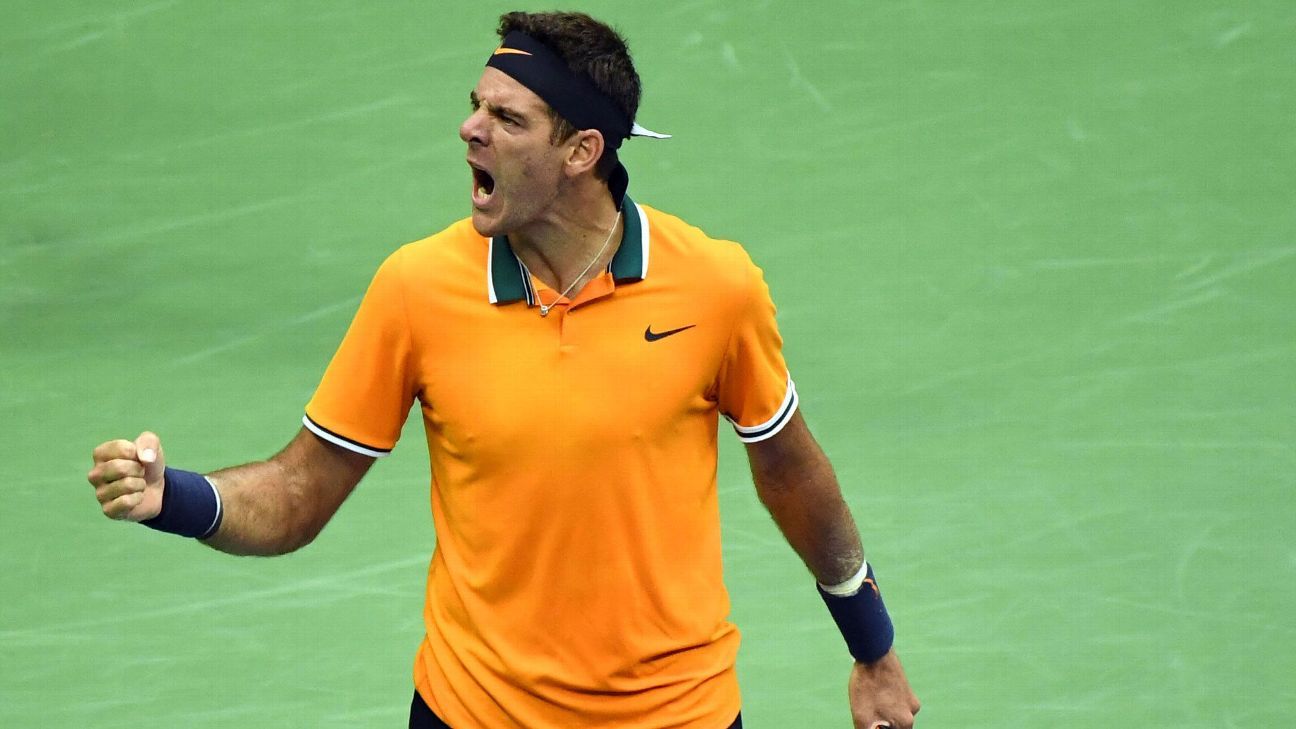NEW YORK — He had waited so long, endured so much frustration, pain and anxiety, but when the moment Juan Martin del Potro had been waiting and working toward for nearly a decade finally arrived Friday in Arthur Ashe Stadium, it was anticlimactic.
Rafael Nadal, with his bare arms glistening with perspiration and his carbon gray sleeveless shirt soaking through, walked toward del Potro, who rose from his courtside chair to meet him. A confused murmur ran through the packed stadium. The players conferred, heads close like a pair of officials. Nadal told his opponent he was done, withdrawing from their US Open semifinals match because of tendinitis in his right knee. Del Potro was leading, 7-6 (3), 6-2. Then they embraced.
Out of respect for Nadal, del Potro did nothing to celebrate except gently pump his fist a few times. He walked back out on the court to acknowledge the crowd with a few muted hand gestures.
“I can’t believe that I will have the chance to play another Grand Slam finals in here, which is my favorite tournament,” del Potro said later. “It would be special to me. And in the finals, anything can happen. If I win, great — if not, I been playing a great tournament and I will be happy anyways.”
That final Sunday against resurgent Novak Djokovic at 4 p.m. ET on ESPN, is likely to be a more severe challenge than Djokovic ended up facing in the semis. But who can begrudge the 6-foot-6 native of Tandil, Argentina, and his smooth passage to the championship round after so many years of travail? He’s the survivor of three surgeries on his wrists, a condition that forced him to play with something like half a game through long periods of a drawn-out, labored comeback.
As Roger Federer said, in a gracious moment after he was beaten by del Potro in the Indian Wells final in March, “What’s interesting is that he put himself out there with no double-hander [backhand] almost. I guess he knew it was going to probably not be enough against some players, but he was happy enough playing this way, which I admire a lot. That’s why I’m also very happy for him.”
Del Potro is using his two-fisted backhand more frequently again, and he has smoothly integrated the slice into his game. He has been persistently harassing the more prosperous Grand Slam champions, with 10 wins now over No. 1 players — the most by any player never to hold the No. 1 ranking.
That honor is cold comfort for del Potro, who might have beaten Djokovic or Andy Murray out for a spot in the Big Four if not for his wrists. At 29, del Potro is younger than either man. He was unable to defend the title in 2010 because of his wrist injury. That’s one reason he was so emotional about his achievement Friday.
“I won my only Grand Slam here,” del Potro said. “When I was a kid, I mix watching soccer and the US Open, that’s it. That’s why I say that this could be my favorite tournament.”
Del Potro’s childhood fantasies of playing in a World Cup for Argentina remained just that, but his dreams of competing at the US Open came true. And when that happened, he was moved and inspired by the way New Yorkers took to him, despite the fact that he barely spoke English and was painfully shy despite being of imposing size and rugged frame.
“I played well,” he said. “I got too much energy from the crowd. I have a lot of fans who came specifically to this tournament. That’s why it is my favorite one on tour.”
Del Potro’s serial surgeries put a damper on his enthusiasm as well as his game. He missed this event twice between 2010 and 2014, and his best result when he did play was the quarterfinals in 2012. He played only four ATP matches in 2015, which was his darkest period.
“I was close to quit this sport because I couldn’t find a way to fix my wrist problems,” he said. “I’ve been suffering a lot. I got depressed for couple of months also. That was the bad moment for me.” But del Potro had allies in his struggle, a group of about a dozen friends who accompanied him to New York this year. They’ve been ubiquitous at this tournament, inciting volleys of the familiar “Ole, Ole, Ole, Del-po, Del-po” chant. “You see the friends who come to watch me?” del Potro said. “They are very important for me to be in this stage at the moment because they were behind me in that years, trying to keep my mind in positive way, for never give up during my wrist problems. I didn’t know if I will be a tennis player again or not. But I’m here. I’m exciting to keep surprising the tennis world, as I did with myself. Never knows what could happen in the future.” As it turned out, members of del Potro’s posse played a striking role in his win. They were billeted in a luxury suite at midlevel of Arthur Ashe, turning it into perhaps the first such box where jeans and a T-shirt were compulsory, with khakis and blue blazers out. They enlivened things from the get-go with an expanded repertoire of cheers and chants. They were most useful during the first-set tiebreaker, when Nadal still appeared healthy. When del Potro scored a key mini-break in the tiebreaker, his friends launched the “Ole” chant anew. This time, the crowd reaction was not merely amusement. A large portion of the stadium picked it up. You could almost feel the love for del Potro coursing round and round in Ashe. “In that tiebreak I felt the energy from almost all the crowd were behind me,” del Potro said of the moment. Asked if he also drew energy from the crowd, he replied, “Yeah, a lot.” Del Potro will almost certainly have the crowd in his corner in the final Sunday. It’s a shame that being deserving of a win won’t automatically get del Potro one. But that big forehand and fierce serve just might.

